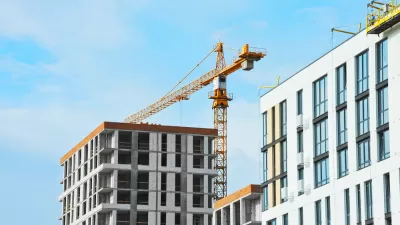Planning student Jennie Moore is going a step beyond the 'ecological footprint' model, and is researching what she calls the 'one-planet city'.
"...Jennie starts with the premise that the city, currently conceived as an isolated unit of human population, is inherently unsustainable. She says:
Cities are basically concentrated hubs of trade and consumption. From a thermodynamics and complex systems theory standpoint, cities are dissipative structures – they consume materials and energy and produce waste. They're dependent on surrounding ecosystems; they can't function within their own geographical boundaries. However, cities are also hubs of organizational capacity. So my research asks at what scale, at what point does a city exceed its share of global ecological carrying capacity and how could that impact be reduced?
Her investigation into the notion of a one planet city is informed in part by "One Planet Living Communities" such as BedZED (Beddington Zero Energy Development), an eco-village in the UK. But unlike these new, "clean slate" communities that are constructed to be models of ecological sustainability, Jennie Moore's one planet city concept deals with the more challenging fabric of existing cities – specifically those in the developed world, i.e. North America, Europe, Japan, etc. North American cities, for example, generally have ecological footprints so high that if everyone were to live like the average citizen of these cities, 4 or 5 planets would be required to sustain their levels of consumption and waste production."
FULL STORY: Conceptualizing the One Planet City

Planetizen Federal Action Tracker
A weekly monitor of how Trump’s orders and actions are impacting planners and planning in America.

Map: Where Senate Republicans Want to Sell Your Public Lands
For public land advocates, the Senate Republicans’ proposal to sell millions of acres of public land in the West is “the biggest fight of their careers.”

Restaurant Patios Were a Pandemic Win — Why Were They so Hard to Keep?
Social distancing requirements and changes in travel patterns prompted cities to pilot new uses for street and sidewalk space. Then it got complicated.

Platform Pilsner: Vancouver Transit Agency Releases... a Beer?
TransLink will receive a portion of every sale of the four-pack.

Toronto Weighs Cheaper Transit, Parking Hikes for Major Events
Special event rates would take effect during large festivals, sports games and concerts to ‘discourage driving, manage congestion and free up space for transit.”

Berlin to Consider Car-Free Zone Larger Than Manhattan
The area bound by the 22-mile Ringbahn would still allow 12 uses of a private automobile per year per person, and several other exemptions.
Urban Design for Planners 1: Software Tools
This six-course series explores essential urban design concepts using open source software and equips planners with the tools they need to participate fully in the urban design process.
Planning for Universal Design
Learn the tools for implementing Universal Design in planning regulations.
Heyer Gruel & Associates PA
JM Goldson LLC
Custer County Colorado
City of Camden Redevelopment Agency
City of Astoria
Transportation Research & Education Center (TREC) at Portland State University
Camden Redevelopment Agency
City of Claremont
Municipality of Princeton (NJ)





























